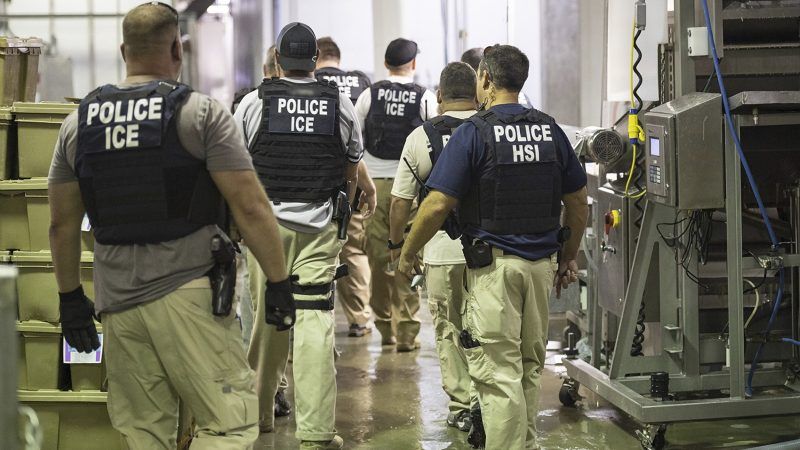Boycotting Big Meat Is Not the Answer to ICE Raids on Immigrant Food Processors
An open immigration policy means letting people from anywhere work for whatever amount they want.

Earlier this month, agents from Immigration and Customs Enforcement (ICE) raided seven poultry processors in Mississippi, "arresting 680 mostly Latino workers in the largest workplace sting in at least a decade."
The raids are intended to advance the Trump administration's "signature domestic priority to crack down on illegal immigration." A Trump administration official claimed they may be among the largest such raids ever.
While nearly half of those arrested were found to be U.S. citizens or people working legally in the country, poultry processing involves backbreaking, monotonous, and often dangerous work that U.S. citizens generally are often unwilling to perform. "[T]he plants' tough processing jobs have mainly been filled by Latino immigrants eager to take whatever work they can get," the AP reports.
In a complicated piece in The Atlantic last week, Fast Food Nation author Eric Schlosser wrote, "Far from being a drain on the American economy, immigrants have become an essential component of it." (If I were splitting hairs, I'd argue immigrants have always been an essential component of the U.S. economy.)
Schlosser describes the many "poor, vulnerable, undocumented, often desperate" immigrant farmworkers and food-industry workers he's met over the years as "hardworking" and "the bedrock of our food system." They're people who have "taken enormous risks and suffered great hardships on behalf of their families." Schlosser laments that "they are now being scapegoated, hunted down, and terrorized" by the Trump administration.
I agree with each of those points. But Schlosser also blasts the "multinational companies that dominate our food system [and] have for many years embraced the opportunity to exploit [immigrant labor] for profit." But aren't those the same companies that employ the hardworking immigrants Schlosser supposedly champions?
Schlosser then proposes a solution that's likely to exacerbate the very problems he wants to solve. He urges U.S. consumers not to by foods that are "produced by America's large industrial meatpacking companies." In other words, Schlosser wants Americans to boycott many of the largest companies that employ immigrants—legal and undocumented alike.
Boycotting their employers probably won't help immigrants. But while Schlosser's main gripe is with Trump, an overriding theme in his piece is that immigrant labor has supplanted union labor—largely, he adds, because food companies prefer the lower wages and greater power imbalance that comes with hiring undocumented workers.
Unions (and their supporters) and immigrants have long had an uneasy relationship. Famed California farmworker and union activist Cesar Chavez and his United Farm Workers (UFW) union didn't exactly embrace immigrants or immigration. In fact, some of their activities sound downright Trumpian in nature.
"In 1973, the UFW established 'wet line' outposts along the Arizona-Mexico border to prevent Mexicans from entering the United States to break UFW strikes," PBS detailed as part of a 1997 documentary on Chavez, which also notes the UFW's "mistreatment of undocumented workers in Arizona."
More recently, unions have sought to bolster their waning membership by embracing immigrant laborers.
Schlosser wants more union jobs. I want the U.S. to welcome more immigrants. Both of us want to defeat the forces of anti-immigrant animosity, like Trump, who called the raids "a very good deterrent," and Mississippi's Republican Lt. Governor Tate Reeves, who's running for the state's top job and praised the raids that put his own neighbors in chains.
So why not open up our borders and allow anyone who wants to work in this country to do so?


Show Comments (283)